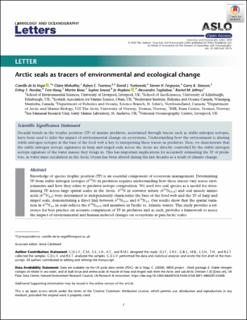Arctic seals as tracers of environmental and ecological change.
De la Vega, C.; Mahaffey, C.; Tuerena, R.E.; Yurkowski, D.J.; Ferguson, S.H.; Stenson, G.B.; Nordøy, E.S.; Haug, Tore; Biuw, Martin; Smout, S.; Hopkins, J.; Tagliabue, A.; Jeffreys, R.M.
Peer reviewed, Journal article
Published version
Permanent lenke
https://hdl.handle.net/11250/2719540Utgivelsesdato
2020Metadata
Vis full innførselSamlinger
- Articles [3009]
- Publikasjoner fra CRIStin [3056]
Sammendrag
Knowledge of species trophic position (TP) is an essential component of ecosystem management. Determining TP from stable nitrogen isotopes (δ15N) in predators requires understanding how these tracers vary across environments and how they relate to predator isotope composition. We used two seal species as a model for determining TP across large spatial scales in the Arctic. δ15N in seawater nitrate (δ15NNO3) and seal muscle amino acids (δ15NAA) were determined to independently characterize the base of the food web and the TP of harp and ringed seals, demonstrating a direct link between δ15NNO3 and δ15NAA. Our results show that the spatial variation in δ15NAA in seals reflects the δ15NNO3 end members in Pacific vs. Atlantic waters. This study provides a reference for best practice on accurate comparison of TP in predators and as such, provides a framework to assess the impact of environmental and human‐induced changes on ecosystems at pan‐Arctic scales.
